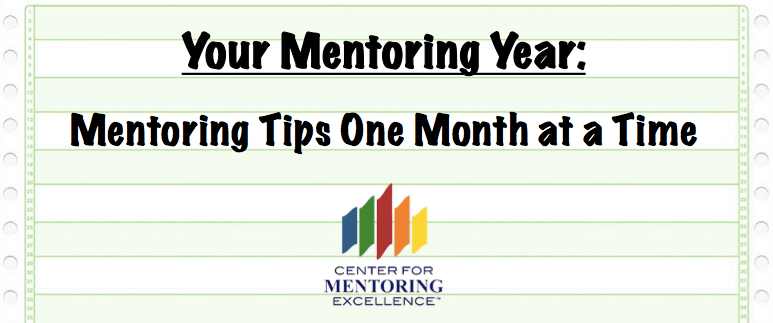
by Center for Mentoring Excellence | Apr 3, 2017 | Goal Setting Conversation, Growth and Development, Making Mentoring Work For You, Mentoring Relationships, Supporting Mentors and Mentees
How is your year going so far?
With summer right around the corner, we thought it was the perfect time to inject some energy and excitement into your mentoring relationships.
So how about some helpful tips and tools? Just like any other healthy habit, building and sustaining thriving mentoring relationships is a non-stop process, requiring constant care, learning and adjusting.
With this in mind, we’re starting a new program for you — Your Mentoring Year: Mentoring Tips One Month at a Time. Each month we will focus on a mentoring practice, approach or technique that contributes to your mentoring excellence. As part of each month’s tip we’ll discuss why it’s important and how you can specifically apply these practices immediately to enhance your mentoring relationships. It’s both informative and actionable!
After a full year, you can refer back to these monthly tips to assess your effectiveness.
Sound good? Keep an eye out for our first month’s tip early this week!

by Center for Mentoring Excellence | Dec 20, 2016 | Facilitating Learning, Growth and Development, Making Mentoring Work For You, Mentoring Relationships, Supporting Mentors and Mentees
Being a mentor (and a mentee) often means working with and building relationships with members of other generations — both older and younger. Here’s your go-to mentoring guide for cross-generational mentoring relationships: (more…)

by Center for Mentoring Excellence | Aug 11, 2016 | Facilitating Learning, Goal Setting Conversation, Growth and Development, Making Mentoring Work For You, Mentoring Questions, Mentoring Relationships
One of the biggest parts of mentoring? Asking questions! But when should you ask questions? And when the time is right, what should you ask? Here’s a handy list of questions you should be asking your mentee over the course of your mentoring relationship:
For starting the mentoring relationship:
- How do we make this process work for you?
- What are your expectations?
- What would you recommend we do to make this work?
- What are you willing to commit to?
For goal setting:
- What is the most important thing you want to achieve?
- What can I do to help you with your leadership development?
- What is your strongest attribute?
- Where do you see your challenges?
- What would help raise your confidence level?
For pushing and challenging your mentee:
- Is this goal worthy of our time and effort together?
- What might be a challenging project for you to undertake?
- What would it be like to step out of your comfort zone?
- How is this goal going to contribute to your development?
- Did you think you are putting in sufficient effort to accomplish results?
- Why do you think there is only one solution? What else might you try?
- If you were grading your results, what grade would you give yourself?
For goal achievement:
- Did you get the results you hoped for?
- How would you approach this situation?
- Where else can you apply that?
- What is your team looking for from you?
- Is your supervisor seeing a difference?
- How else might you tackle that?
For checking in and feedback:
- What value has this provided for you thus far?
- What can we do differently to improve this relationship?
- Are we on the right path?
- What feedback have you received?
- How do you know you are making an impact?
- How can we make this work for both of us?
- How do you think you are doing?
- Are you satisfied with your results?
- Are you putting in the effort you feel you should?
- You’re quiet … what are you thinking?
- Whose feedback would be a benefit to you?
Ready to get started? Let us know how these questions help improve your mentoring relationships.
(Photo via Flickr CC: Colin_K)

by Center for Mentoring Excellence | Aug 2, 2016 | Facilitating Learning, Making Mentoring Work For You, Mentoring Relationships
So, you’ve decided that you want to start a mentoring relationship. But now what? You need to find a mentor. That might be easier said that done, however. Finding a mentor that’s a good fit for you is an important part of the mentoring process, one that is worth the effort and the time.
And it’s about more than just finding someone you like. You need to be intentional about finding a mentor, and you must consider more than personality — consider learning styles and communication styles.
Here are some things to consider as you begin your search:
- It starts with you — What are you looking to learn? What attributes are you looking for in a mentor? Knowledge, expertise, experience (or all of the above)?
- Identify your “must haves” — What do you need to have in a mentoring relationship? Make a list!
- Use your network like crazy — Tell people what you’re looking for. You never know who they might be able to introduce you to! Meet people, get contact information, research names, find out what you can. Your network is a great tool when looking for the ideal mentor.
- Go back to your list — Once you’ve collected a list of possible mentors, figure out who meets your criteria (and who doesn’t) and begin to select the ones you’d like to reach out to.
Some do’s and don’ts:
- Don’t:
- Pick someone who will be too easy on you
- Select someone just because they like you
- Choose someone because they are the most convenient
- Opt for someone because you already have a relationship
- Choose someone you report to directly
- Do:
- Seek a good learning fit between what you need and what this person has to share
- Find out if this person has sufficient time to mentor you
- Ask yourself if this person will challenge and encourage you to constantly raise the bar for yourself
- Consider if this person appears to be a good listener, has a sincere desire and willingness to mentor, and the knowledge and expertise you need.
Now the fun part: Meet them! Make sure to set up time to get to know your potential mentors, and see if they fit your mentoring criteria. Once you meet them you’ll quickly be able to tell if they are the right one for you.
(Photo via Flickr CC: Mateus Lunardi Dutra)

by Center for Mentoring Excellence | Apr 14, 2016 | Growth and Development, Making Mentoring Work For You, Mentoring Communication, Mentoring Questions, Mentoring Relationships
Chemistry. Compatibility. While these traits are crucial to a successful mentoring relationship, there’s so much more involved, most importantly — you. What do you want to learn? Who do you want to learn it from? Recruiting a mentor can seem like a daunting task, but being thorough and prepared when making the ask leads to success.
How to Prepare
Have a conversation with yourself:
- Identify what it is you need to learn.
- Think about what you need from a mentor.
- Consider how much time you can contribute to a mentoring relationship. Look yourself in the mirror and honestly consider if you have the time, willingness and commitment to mentoring.
- Think about your prior mentoring experiences and how you can actively contribute to the success of your relationship.
Ask yourself some important questions:
- Am I sincerely interested in learning?
- Am I willing to commit time to developing and maintaining a mentoring relationship?
- Am I willing to be open and honest with myself and another person?
- Can I participate without aversely affecting my other responsibilities?
Making the Ask
You can do all the preparation in the world, but if you aren’t able to communicate your needs and ask a potential mentor for their time and energy in an inviting and honest way, you may lose out on a great mentoring opportunity.
Make sure to clearly communicate:
- What you want to learn.
- Why you want to learn it.
- Why you think this person is a good match for you.
- What you need from the relationship.
- What you are willing to contribute.
Make sure to present yourself as:
- Competent
- Committed
- Compatible
- Conscientious
- Ready to Learn
- Accountable
With the right preparation, the right communication and the right presentation, you’ll be able to set yourself up for success when asking a potential mentor for their help.
How have you sought out mentors? What worked and didn’t work for you?

by Center for Mentoring Excellence | Mar 21, 2016 | Goal Setting Conversation, Growth and Development, Mentoring Relationships, Supporting Mentors and Mentees
The Importance of the First 90 Days
It’s a fact: The first 90 days sets the tone for your mentoring relationships! According to Lory Fischler, co-author of Starting Strong (Jossey-Bass 2014), “Many mentoring relationships don’t actually survive the three-month milestone. That’s because they start with good intention and energy but get derailed by lack of time, structure, purpose, progress and accountability.”
We’ve identified six essential conversations that we believe ought to take place during the first 90 days of a mentoring relationship to ensure that it starts strong and stays focused. These conversations set the tone for mentoring success.
Conversation #1: Mentoring partners often jump into mentoring too soon and fail to take the necessary time to get to know one another. When mentoring partners spend time to build their relationship by engaging in real conversation, they are better able to establish the high level of trust that is critical for learning and growth.
Conversation #2: Once trust has been established, it is time to decide how to structure your mentoring relationship and your meetings so that you stay on track. By proactively talking about ground rules, confidentiality, hot buttons and boundaries, mentoring partners avoid problems along the way.
Conversation #3: A robust series of conversations about the mentee’s goals is often more important than the process of formally defining them. Through conversation an effective mentor facilitates mentee understanding about his or her needs and the areas of potential growth necessary to meet those goals.
Conversation #4: Once goals have been identified, it’s time to talk about how to achieve them. This is accomplished by identifying learning opportunities to support and challenge the mentee — to encourage a mentee to stretch and stand outside his or her comfort zone. This where true growth and development occur.
Conversation #5: Along the way, there may be stumbling blocks that get in the way of the relationship. Holding a conversation to address them as soon as they occur keeps the focus on progress and forward movement.
Conversation #6: The three-month milestone is ideal for holding a two-way feedback check-in conversation. By addressing meaty questions (i.e., “What has been the biggest learning to date? What are we doing that is providing value? What is working and what could be better?”) both mentor and mentee receive feedback that enables them to elevate their individual skills.
You won’t want to miss our day-long conference, Making Mentoring Matter: Strategies and Tools for Individual Development and Organizational Effectiveness on Wednesday. May 4, 2016 in Bellevue, WA., where Lory Fischler will be presenting a workshop entitled “Starting Strong: The First 90 Days.”








